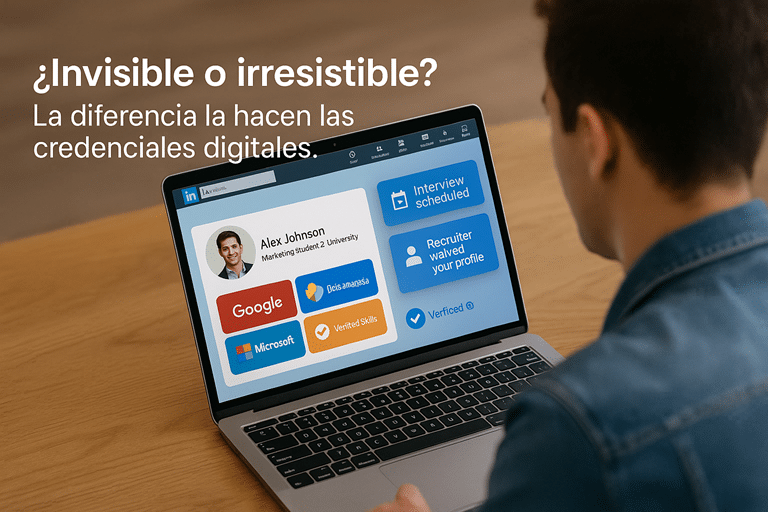In the dynamic world of higher education, a crucial question arises: Is traditional education or competency-based education more effective? This article explores the fundamental principles of both approaches and highlights the importance of digital credentials in the learning model that prioritizes skills.
What is Competency-Based Education?
La competency-based education (ECB) is an educational model that focuses on developing specific skills and knowledge that students need to be successful in their careers and lives. Unlike traditional education, which focuses on time and content, CBE focuses on the mastery of specific competencies. Students progress at their own pace, demonstrating proficiency in key areas before advancing.

Main characteristics of Competency-Based Education
- Personalization of learning: Students learn at their own pace.
- Continuous assessment: The evaluation is continuous and based on the demonstration of skills.
- Relevance to the real world: The skills are aligned with the needs of the labor market.
- Focus on results: Success is measured based on concrete and applicable results.
Comparison between traditional education and competency-based education
Fundamental principles
Traditional Education:
- Focus on time and attendance.
- Evaluation based on standardized tests.
- Fixed and structured curriculum.
- Uniform progress for all students.
Competency-based education:
- Focus on mastering specific competencies.
- Evaluation based on continuous demonstration of skills.
- Flexible curriculum adapted to the needs of the student.
- Individualized progress based on the student’s pace.
Key differences
Flexibility: Traditional education follows a fixed calendar, while CBE allows students to progress at their own pace.
Evaluation: In traditional education, evaluations are periodic and standardized. In the EBC, the evaluation is continuous and based on projects and practical demonstrations.
Results: Traditional education focuses on the acquisition of theoretical knowledge, while CBE focuses on the development of practical and applicable skills.
Competency-based training approaches
Competency-based training approaches focus on several crucial aspects:
- Personalized learning: Adapt education to the needs and rhythms of each student.
- Professional orientation: Align skills with the demands of the labor market.
- Educative technology: Use digital tools to facilitate learning, evaluation and certification of skills.
- Authentic evaluation: Use evaluations that reflect real and practical situations.
The importance of Digital Credentials in the competency-based educational model
In a competency-based educational model, digital credentials they play a crucial role. These credentials validate and recognize the skills and competencies acquired by students in a transparent and verifiable manner. Benefits include:
- Portability: Students can share their credentials digitally with employers and professional networks.
- Transparency: Employers can easily verify specific skills and competencies.
- Motivation: Digital credentials increase student motivation by offering tangible recognition of their achievements.

In conclusion, competency-based education represents a significant advancement in the way we prepare students for an ever-evolving world of work. This model not only responds more effectively to the individual needs of students, but also aligns education with real market demands.
Adopting a competency-based model is not just an innovation, but a necessity to stay relevant and competitive. This approach not only improves educational outcomes, but also strengthens the institution’s reputation by producing highly competent graduates prepared to meet the challenges of the professional world.
We invite you to download the video “Digital trends in skills recognition” to learn more about how digital credentials can improve competency-based education.
Subscribe to blog here and receive all our content







